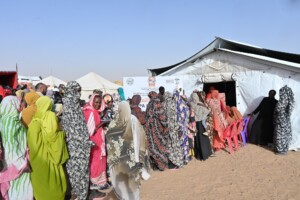Sudan calls for adoption of Indian Rupee for bilateral trade
India should push for the use of its Rupee in bilateral trade in Africa, the Sudanese ambassador to India said on Friday. President Omar Al Bashir will arrive in Delhi on 28 October.
Ahead of the India-Africa Summit, 26-30 October, which President Omar Al Bashir will attend, Ambassador Hassan El Taleb stated that Africa was under “monetary colonisation” owing to the dependence on the US Dollar. He added that there is no reason why the Indian government should not push for the adoption of Indian Rupees in commercial transactions.
India should push for the use of its Rupee in bilateral trade in Africa, the Sudanese ambassador to India said on Friday. President Omar Al Bashir will arrive in Delhi on 28 October.
Ahead of the India-Africa Summit, 26-30 October, which President Omar Al Bashir will attend, Ambassador Hassan El Taleb stated that Africa was under “monetary colonisation” owing to the dependence on the US Dollar. He added that there is no reason why the Indian government should not push for the adoption of Indian Rupees in commercial transactions.
Sudan has been on the US list of ‘state sponsors of terrorism’ since 1993. In 1996 and 1997, Washington imposed broad economic sanctions on the country. Experts say that the sanctions significantly contributed to the rise in the black market exchange rate of the US Dollar.
In September 2010, the Central Bank of Sudan announced that the lack of hard currency was becoming acute. The situation worsened after South Sudan seceded in July 2011, by which Sudan lost two-thirds of its oil revenues to the South, an important source of hard currency. A Sudanese economist predicted earlier this month that a continuation of both the economic sanctions and the armed conflicts in the country will further push the black market US Dollar rate to rise.
Gold and agriculture
According to Ambassador El Taleb, Sudan annually produces 70 tons of gold. As for the agricultural sector, he noted that Indian farmers are welcome to cultivate land in Sudan, “not only to feed Sudan, but also for the export market.
“By investing in Sudan, India can easily sustain its market. The farming technologies used by India are very much adaptable to African nations,” he added.
India has become one of Sudan’s top trading partners over the past few years. India’s 2014-15 exports to Sudan reached $882.47 million, while imports stood at $569.66 million.
Indian farmers are welcome to cultivate land in Sudan, “not only to feed Sudan, but also for the export market".
The spokesman for the Indian Ministry of External Affairs, Vikas Swarup, stated that Sudan is open to Indian investment in agriculture, gold mining, and petroleum.
“Over the years, Sudan has emerged as a major producer of gold. We want India to invest more in gold mining, apart from other areas such as agriculture and infrastructure, through which Indo-Sudanese relations can reach new heights,” he said.
President Omar Al Bashir will arrive in Delhi on 28 October for his first visit to the country after he was indicted by the International Criminal Court (ICC) for war crimes and crimes against humanity in 2009 and genocide in 2010, all related to the conflict in Darfur.
Swarup reiterated on Friday that India is not a member of Rome Statute and therefore does not need to abide by its directives.
(Source: The New Indian Express)











 and then
and then